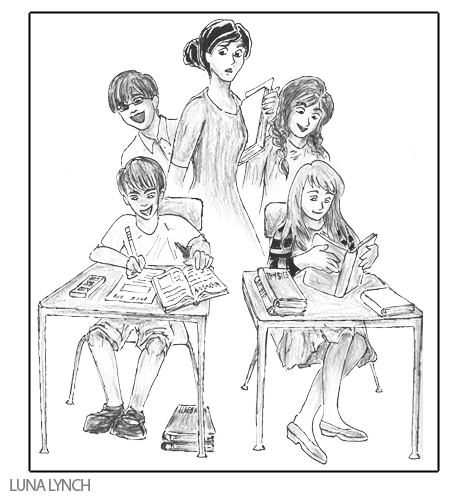
A typical student’s yearly schedule consists of one math and one science course. However, in recent years, a small, but rising percentage of students have deviated from the traditional schedule and are making the decision to take either two math classes or two science classes.
In some cases, students plan to pursue math or science in the future, so they choose to double up as it allows them to get a head start for the future. Taking both AP Biology and Physics 1-2, junior Ariana Ross says, “I’m going to go into medicine and Mr. Richmond recommended that I take Physics as well as AP Bio.”
With a similar purpose, taking both AP Chemistry and Physics 1-2 is junior Anna Olson who states, “In the case of AP courses, you get…a better preparation for the college courses. That’s partly why I’m taking AP Chem. It’s been described as a ‘killer’ course, but I figure that I would rather ‘fail’ through it in high school than truly fail it in college.”
While some students who double up seek extra grade benefits, there are those who double purely for the joy of learning. Junior Christian Cabuslay, currently taking Calculus BC and AP Statistics, admits, “Obviously, the GPA boost and the college credits are a nice benefit to taking the two classes. However, another benefit that is commonly overlooked is knowledge.”
There are also situations where doubling is deemed necessary for students. Math Teacher Richard Serrao says, “Students who double may also do so because they need it to strengthen their math skills through math support classes.” It may become compulsory for seniors who do not have a sufficient amount of credits to graduate.
Yet, when it really comes down to doubling, some actually find it less difficult to manage than expected. Junior Sophia Wienbar, currently taking AP Chemistry and Physics 1-2, says, “I have been able to manage the extra workload fairly easily…One would think that my stress level would rise from taking two science classes, but, in reality, it’s not that bad since Physics is actually my fun, stress-relieving class.”
While some have little trouble with doubling, others begin to experience the difficulty of it. “Sometimes I get confused between the concepts for each class. Like in Pre-Calc, I sometimes use methods learned in Stats to solve problems, and then I’d get the question wrong and have to redo it,” says sophomore Jaehee Park.
Acknowledging how challenging doubling can be, Math teacher Alice Hu comments, “[Doubling] depends on the student. Some push themselves even if they aren’t strong in the subject, just so that they can stand out to colleges. I don’t think that is okay, but if they have an actual interest in it, then I think it is fine.”
Accordingly, Serrao feels, “Only those who are especially motivated and those who need it should take double math and sciences. Everyone else should just stick with the rest of the wonderful courses Aragon has to offer, one at a time.”
In addition, concerned about the toll doubling may have on a student’s daily life, Co-Vice Principal Jim Coe warns, “The biggest issue [with doubling] is over-commitment. If you don’t have all the time to fulfill all of your commitments, try to find balance and realize how many hours you want to devote to each of your academic, social, and extra-curricular lives. However, if you don’t, then you will realize how much work significantly increases.”
Looking at the bigger picture, Science teacher Amy Schwartz points out, “[Doubling] is really hard, especially for people with after school activities, but math and science are very important if you think about how our country and economy are today. The U.S. is falling behind, so students should be encouraged to take more of those classes because the U.S. needs more people with science and math backgrounds.”
On the whole, doubling a math or science offers many valuable benefits to an individual, but depending on the type of person and the type of classes being taken, the level of difficulty it requires to manage and perform well in those classes vary from person to person. For this reason, Olson, on whether or not one should double math and sciences, advises, “Just know your limits and be reasonable.”




